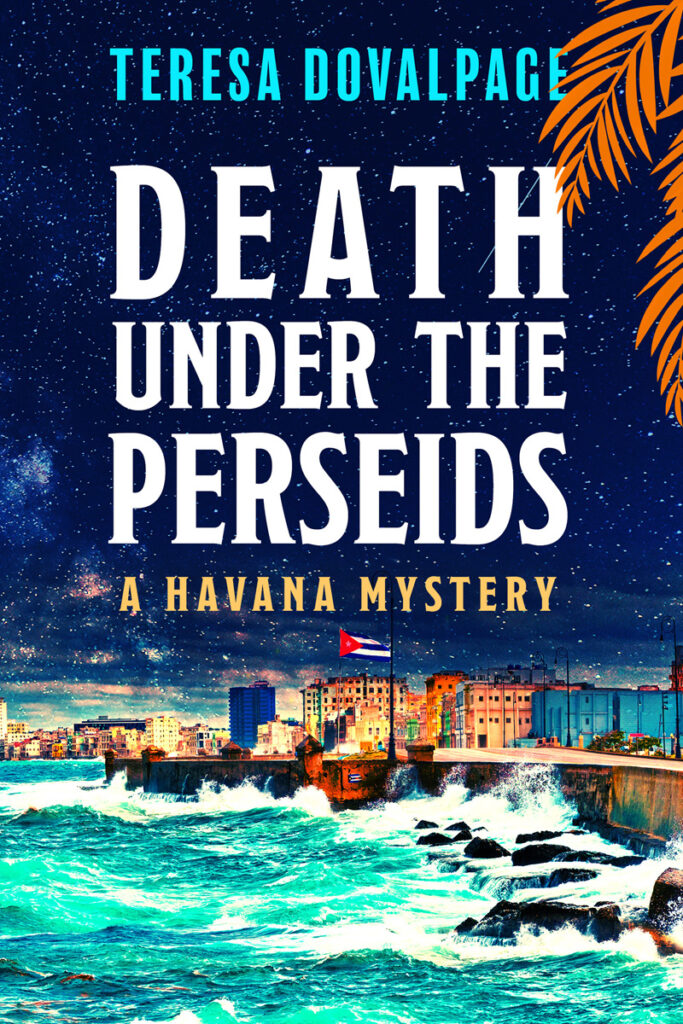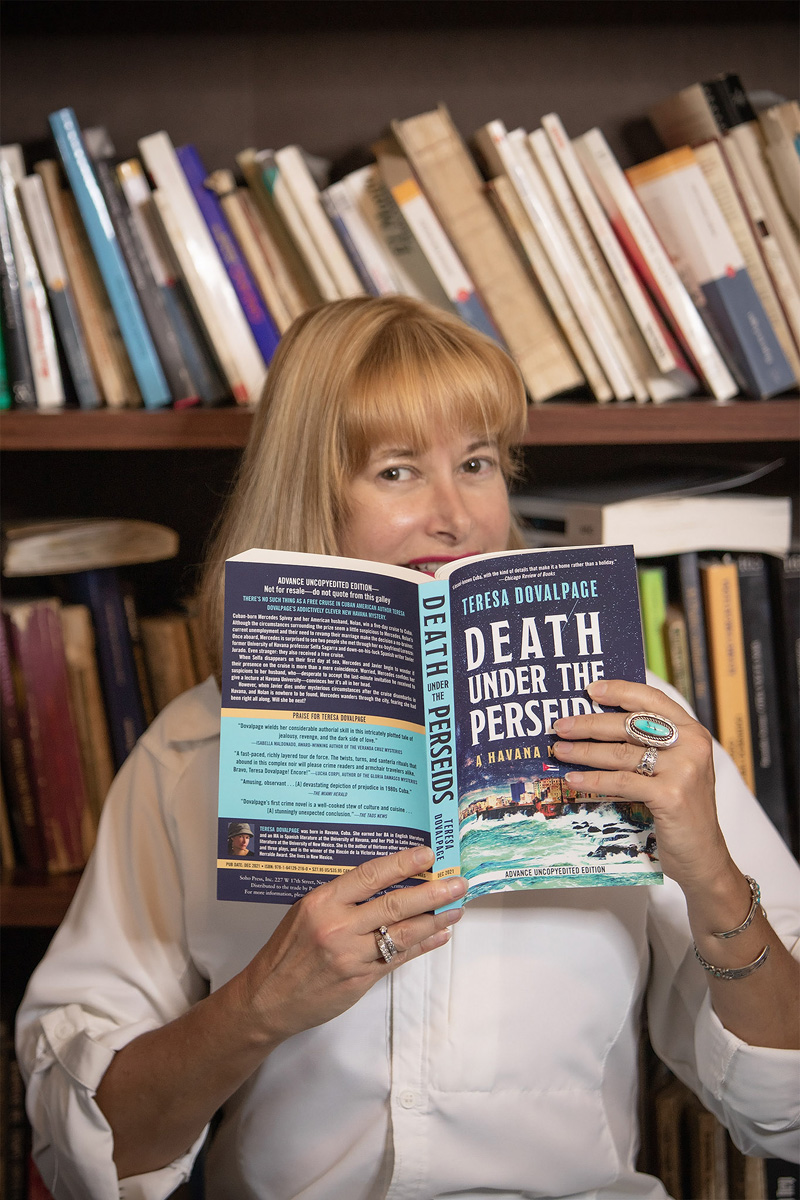Book review

After reading the latest novel, Death Under The Perseids from our own Teresa Dovalpage, I so want to visit Cuba! I don’t yet speak Spanish (Duo Lingo lessons may kick in?) so I can’t converse much with people there, or know a laundromat from a bar, but based on Dovalpage’s descriptions of her home country‚ the food, and the quirky characters who comprise the action in this turny twisty mystery set in Havana, I want to go—preferably with the author as my personal tour guide.
Dovalpage’s avatar in this 320+ page drama is Merceditas—Mercy, Americanized, or Mercedes. The intrigue unfolds in three places: on a cruise ship, where she was mysteriously offered free passage; in Havana, once the ship docks; and in her peripatetic mind.
Mercy is not a likable character: a seemingly superficial directionless flighty young woman, whose part-time job grooming dogs in a shishi salon in Florida is definitely not her calling. But then, she seems to not care much about anything, except to turn over and over in her mind her past romantic choices, giving herself guilt when it comes to these amantes, and drinking too much, which she admits doesn’t help things.
Not far into the book, we learn of her current hubby, Spanish teacher Nolan, and Lorenzo, her lost love—through flashback passages, active daydreaming, tragic reminiscences, and passionate regrets. Other characters related to these two flesh out the cast and pacing; it feels at times like I’m watching, rather than reading, an episodic drama with multiple commercial breaks, as she deftly drops us in and out of a variety of places in time or space.
The perceptive and often lovely descriptions are few and far between, but they hold the book together: scenes of Havana, her grandmother’s garden, and food. Here are some of my favorites:
Javier drank furiously. I watched him—his rodent-like countenance, with furtive eyes and a small round mouth.
The pendant light didn’t work—something had gone wrong with the wiring, Mamina said. She turned on a brass table lamp supported by two chubby cherubs. We sat in the rocking chairs that were, like everything else, “vintage,” with carved spindles and busted cane seats. The leather sofa was better avoided; it had angry springs poking through, ready to stab the behind of whoever sat on it.
The inside of the cathedral felt like a warm cocoon. The combination of the dark space and Yotiel’s sugary voice made me sleepy. I started to drift off. Suddenly, perhaps due to the sweetish sandalwood fragrance that filled the temple or the potent smell of roses somebody had brought in, I felt like vomiting.
She sprinkles Spanish slang throughout, but kindly, always hints enough at the meanings in English in subsequent sentences to keep non-Spanish speakers like me interested and engaged. I loved both the sound and meaning of Lo Pasado, pisado: “stamp on the past” or “let bygones be bygones.”
I admit to wanting to see Mercedes develop into more of a self-directed and less shallow character as I read along, but I had to settle for the loving descriptions of her grandmother and her house—the one Mercedes grew up in. Mamina’s can-do attitude in the face of crumbling infrastructure, shortages of essential goods, food rationing, and broken everything, her nurturing and obvious love “just as she is” of Mercedes, grandmother’s home cooking—these pull the reader deeply into the heart of “home,” transcending specificity of locale to tug on the universal human heartstrings. These pose the question and answer of what it means to feel rooted, connected, and loved. Ultimately, this is at the heart of this book, not the murder, the missing persons, the motives for revenge, and certainly not the unlikely way a single letter ties up all the loose ends: although those qualities make for a fun ride!
Death under the Perseids, by Teresa Dovalpage, published Dec. 7, 2021, by Soho Press, Inc., New York, NY, www.sohocrime.com, hardcover, 336 pages.
Teresa Dovalpage is a Cuban writer and professor of Spanish and ESL at New Mexico Junior College. She was born in Havana and left for the United States in 1996. Dovalpage earned her doctorate in Latin American Literature from the University of New Mexico. She has published 12 novels to date. Her third novel, Muerte de un murciano en La Habana (Death of a Murcian in Havana, Anagrama, 2006) was runner-up for the Premio Herralde. Her next novel El difunto Fidel (The Late Fidel) won the Rincon de la Victoria Award in Spain in 2009. She has also published several plays and short story collections. She is the Questa Del Rio News’ official Spanish translator and translates Ellen Wood’s Live Love Laugh column every month.
Author
-

Questa Creative Council Board member and artist: Martha Shepp preaches the gospel of the power of creativity. One of her loves is to collaborate with open-minded genre-free artists like Mark Dudrow, playing life-affirming works that can’t help but spark the innate creativity of listeners like you. Her expressions also take form with words, choreography, and visual art... with ever expanding mashups of all the above.
View all posts



